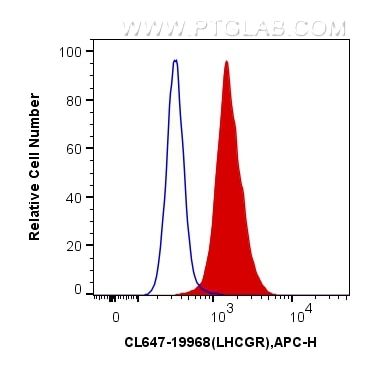CoraLite® Plus 647-conjugated LHCGR Polyclonal antibody
LHCGR Polyclonal Antibody for FC (Intra)
Host / Isotype
Rabbit / IgG
Reactivity
human, mouse, rat
Applications
FC (Intra)
Conjugate
CoraLite® Plus 647 Fluorescent Dye
Cat no : CL647-19968
Synonyms
Validation Data Gallery
Tested Applications
| Positive FC detected in | Jurkat cells |
Recommended dilution
| Application | Dilution |
|---|---|
| Flow Cytometry (FC) | FC : 0.40 ug per 10^6 cells in a 100 µl suspension |
| Sample-dependent, check data in validation data gallery | |
Product Information
CL647-19968 targets LHCGR in FC (Intra) applications and shows reactivity with human, mouse, rat samples.
| Tested Reactivity | human, mouse, rat |
| Host / Isotype | Rabbit / IgG |
| Class | Polyclonal |
| Type | Antibody |
| Immunogen | Peptide 相同性解析による交差性が予測される生物種 |
| Full Name | LHCGR |
| Calculated molecular weight | 79 kDa |
| Observed molecular weight | 90-100 kDa |
| GenBank accession number | NM_000233 |
| Gene symbol | LHCGR |
| Gene ID (NCBI) | 3973 |
| Conjugate | CoraLite® Plus 647 Fluorescent Dye |
| Excitation/Emission maxima wavelengths | 654 nm / 674 nm |
| Form | Liquid |
| Purification Method | Antigen affinity purification |
| Storage Buffer | PBS with 50% Glycerol, 0.05% Proclin300, 0.5% BSA, pH 7.3. |
| Storage Conditions | Store at -20°C. Avoid exposure to light. Stable for one year after shipment. Aliquoting is unnecessary for -20oC storage. |
Background Information
Lutropin-choriogonadotropic hormone receptor (LHCGR, also known as LHR or LSHR) belongs to the rhodopsin-like family of G protein-coupled receptors (GPCRs) and plays a crucial role in the regulation of gonadal functions by stimulating steroidogenesis in response to luteinizing hormone (LH) or hCG (PMID: 15866423). Mutations in LHCGR gene result in familial male-limited precocious puberty, Leydig cell hypoplasia, and empty follicle syndrome (PMID: 30711030). LHCGR protein consists of 699 amino acids with a calculated molecular weight of 79 kDa. Due to massive glycosylation, the molecular mass of the mature LHCGR is higher (85-100 kDa) than the predicted molecular protein mass of 79 kDa (PMID: 23686864; 15866423; 29075189; 15969756).
Protocols
| Product Specific Protocols | |
|---|---|
| FC protocol for CL Plus 647 LHCGR antibody CL647-19968 | Download protocol |
| Standard Protocols | |
|---|---|
| Click here to view our Standard Protocols |


